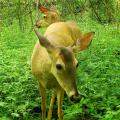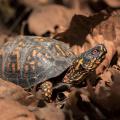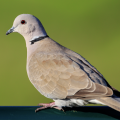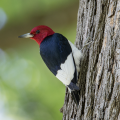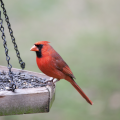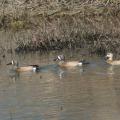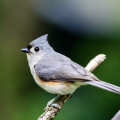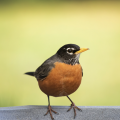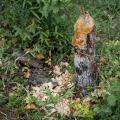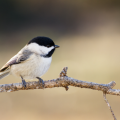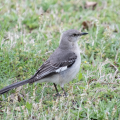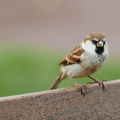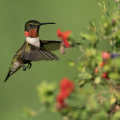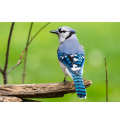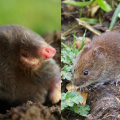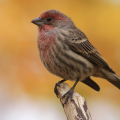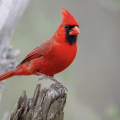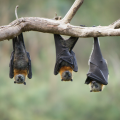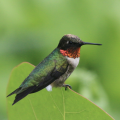News Filed Under Urban and Backyard Wildlife
RAYMOND, Miss. -- An urban wildlife specialist and a group of trained volunteers with the Mississippi State University Extension Service have been tracking wildlife in the Jackson metro area for three years to better understand how gentrification impacts urban wildlife populations.
Their work is part of an unprecedented nationwide study led by Lincoln Park Zoo’s Urban Wildlife Institute and recently published in the journal “Proceedings of the National Academy of Sciences,” or PNAS.
We’ve reached the end of our yearlong series that introduced you to some of Mississippi’s birds! We hope these blog posts have helped you identify and learn more about our feathered friends.
Many birds aren’t as easy to identify as red-headed woodpeckers. With their bright red head and neck feathers and loud pecking noise, they surely know how to make their presence known!
Want your feathered friends to have a supplemental source of food this winter? Set out a bird feeder for them. There are many types of bird feeders, but they are not all created equal. Check out the common types of feeders and decide which ones will work best in your yard.
September tends to mark the end of summer, and our thoughts drift toward cooler weather activities such as fall gardening, football and hunting.
In the world of birds, fall marks the time for many to begin their migration. Most species of birds migrate to some extent, but as renowned waterfowl biologist Frank Bellrose said, “Waterfowl are highly visible in migration; they epitomize this phenomenon for most people.”
The tufted titmouse is a bird you’ve likely seen in parks, woodlands, and in your back yard. They’re native to the eastern parts of the United States and are attracted to areas where there is an abundance of broadleaf trees, such as oaks, hickories, and maples.
“Rockin’ robin, tweet-tweedle-lee-dee!” You sang that sentence as you read it, didn’t you?
Shortly after Emily Duggar bought property in Madison County to build a house near Canton, she realized there were beavers on a creek that ran through the back of the property.
“We saw evidence that beavers were taking down trees and gnawing on trees,” Duggar said. “We could see they were building a dam, and they’ve since built two more dams. The water is rising,” she said. “We haven’t had any flooding yet, but we’ve heard that some people who live in the neighborhoods behind our property have flooding from the creek.”
If you hear a bird call that sounds like a fast, high pitched “chick-a-dee-dee-dee,” you can confidently say it’s coming from a Carolina chickadee– they get their name from this distinctive call.
Every Mississippian is familiar with the northern mockingbird. In 1944, it became the official bird of Mississippi.
“Coo-OO-oo-woo!” With their rather sorrowful call, the mourning dove sings one of the most recognizable songs.
Have you ever noticed the small birds hopping around parking lots scrounging for food and wondered what kind they were? There’s a good chance they were house sparrows.
Everyone loves Ruby-throated hummingbirds! I have fond memories of watching these hummingbirds visit the many feeders my grandparents put out each year. You probably have a similar story! Hummingbirds are fascinating creatures, with their bold-colored feathers and fast-fluttering wings.
Blue jays are easy to recognize by both their noisy call and bold blue feathers. Also known as jaybirds, blue jays are members of the crow family and native to the United States.
Moles and voles are often confused with one another. They both can cause damage to your lawn and their names sound very similar. You can use the beginning letter of their name to help you remember the difference!
We’re on month two of learning about the different types of birds in Mississippi. For February, we’re discussing the house finch.
Northern cardinals are a commonly spotted bird during winter months. If you’re like me, you’ve seen cardinals featured on various holiday décor items. It’s almost like they’re the official bird of winter.
Bats have long been associated with Halloween, and this has fostered many myths about them. They may look spooky to some, but they perform critical tasks in the environment that help humans. The 1,400 species that are spread across six different continents serve an important purpose in our ecosystem. They pollinate plants, distribute seeds, and control insect pests, including mosquitoes. Fifteen different species of these small mammals live in Mississippi.
Hummingbirds are fascinating little creatures and are adored by many people. If you’re a hummingbird lover, you’re probably giddy to have them flock to your yard again this season.

